语法精讲及练习 一般将来时的用法
- 格式:docx
- 大小:16.66 KB
- 文档页数:10
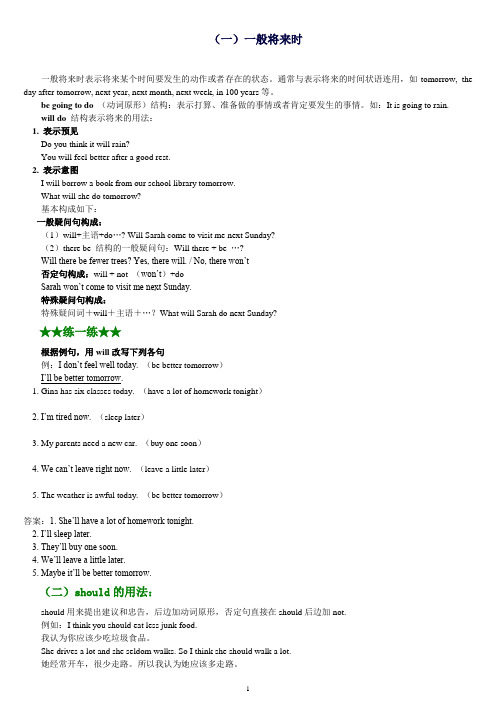
(一)一般将来时一般将来时表示将来某个时间要发生的动作或者存在的状态。
通常与表示将来的时间状语连用,如tomorrow, the day after tomorrow, next year, next month, next week, in 100 years等。
be going to do(动词原形)结构:表示打算、准备做的事情或者肯定要发生的事情。
如:It is going to rain.will do结构表示将来的用法:1. 表示预见Do you think it will rain?You will feel better after a good rest.2. 表示意图I will borrow a book from our school library tomorrow.What will she do tomorrow?基本构成如下:一般疑问句构成:(1)will+主语+do…? Will Sarah come to visit me next Sunday?(2)there be 结构的一般疑问句:Will there + be …?Will there be fewer trees? Yes, there will. / No, there won’t否定句构成:will + not (won’t)+doSarah won’t come to visit me next Sunday.特殊疑问句构成:特殊疑问词+will+主语+…?What will Sarah do next Sunday?★★练一练★★根据例句,用will改写下列各句例:I don’t feel well today. (be better tomorrow)I’ll be better tomorrow.1. Gina has six classes today. (have a lot of homework tonight)_____________________________2. I’m tired now. (sleep later)_____________________________3. My parents need a new car. (buy one soon)_____________________________4. We can’t leave right now. (leave a little later)_____________________________5. The weather is awful today. (be better tomorrow)_____________________________答案:1. She’ll have a lot of homework tonight.2. I’ll sleep later.3. They’ll buy one soon.4. We’ll leave a little later.5. Maybe it’ll be better tomorrow.(二)should的用法:should用来提出建议和忠告,后边加动词原形,否定句直接在should后边加not.例如:I think you should eat less junk food.我认为你应该少吃垃圾食品。
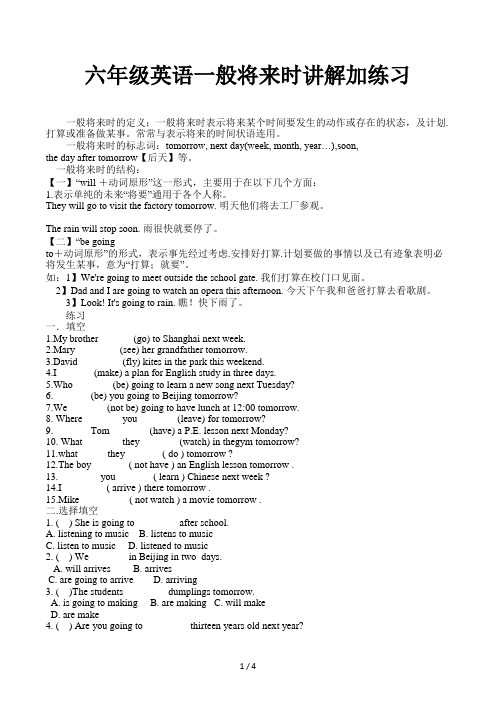
六年级英语一般将来时讲解加练习一般将来时的定义:一般将来时表示将来某个时间要发生的动作或存在的状态,及计划.打算或准备做某事。
常常与表示将来的时间状语连用。
一般将来时的标志词:tomorrow, next day(week, month, year…),soon,the day after tomorrow【后天】等。
一般将来时的结构:【一】“will +动词原形”这一形式,主要用于在以下几个方面:1.表示单纯的未来“将要”通用于各个人称。
They will go to visit the factory tomorrow. 明天他们将去工厂参观。
The rain will stop soon. 雨很快就要停了。
【二】“be goingto+动词原形”的形式,表示事先经过考虑.安排好打算.计划要做的事情以及已有迹象表明必将发生某事,意为“打算;就要”。
如:1】We're going to meet outside the school gate. 我们打算在校门口见面。
2】Dad and I are going to watch an opera this afternoon. 今天下午我和爸爸打算去看歌剧。
3】Look! It's going to rain. 瞧!快下雨了。
练习一.填空1.My brother ______ (go) to Shanghai next week.2.Mary ________ (see) her grandfather tomorrow.3.David ________ (fly) kites in the park this weekend.4.I_______ (make) a plan for English study in three days.5.Who _______ (be) going to learn a new song next Tuesday?6._______ (be) you going to Beijing tomorrow?7.We _______ (not be) going to have lunch at 12:00 tomorrow.8. Where _______ you _______ (leave) for tomorrow?9._______ Tom _______ (have) a P.E. lesson next Monday?10. What _______ they _______ (watch) in thegym tomorrow?11.what _____ they _______( do ) tomorrow ?12.The boy _______( not have ) an English lesson tomorrow .13.________ you _______( learn ) Chinese next week ?14.I ________ ( arrive ) there tomorrow .15.Mike _________ ( not watch ) a movie tomorrow .二.选择填空1. ( ) She is going to ________ after school.A. listening to musicB. listens to musicC. listen to musicD. listened to music2. ( ) We _______ in Beijing in two days.A. will arrivesB. arrivesC. are going to arriveD. arriving3. ( )The students ________ dumplings tomorrow.A. is going to makingB. are makingC. will makeD. are make4. ( ) Are you going to_________ thirteen years old next year?A. will beB. areC. beD. go5. ( ) ___will see a play in 5 days?A. WhenB. WhatC. WhoD. Whose6. ( ) Mary______ English next year.A. will learnB. will to learnC. are going to learn.D. learns7. ( ) He’ll _____ shopping this afternoon.A. goingB. goC. goesD. went8. ( ) Will you ____ at the bus stop at 10:30?A. meetingB. meetsC. meetD. met9. ( ) Lily and I _______ the guitar. next week.A. am going to playB. are going to playC. will playsD. play10. ( ) How ______ Jenny ___ home tomorrow?A. does......goB. is……goingC. will……goD. do……g o11. ( ) Who is going to _________ a song ?A. sings B singing C. to sing D. sing12. ( ) I _________in Beijing in three days.A. are going to arriveB. arriveC. will arriveD. arrives13. ( ) He _______some model planes tomorrow .A. going to makeB. is makingC. will make D makes14. ( ) Are you going to ___________a doctor next year ?A. will beB.. areC. beD. are going to15. ( ) She ________ you make supper this evening .A. helpsB. will helpC. is helpingD. is going help三.把下列句子变成一般疑问句,并给出肯定和否定回答。

初二英语语法分析:一般将来时用法讲解一、一般将来时的概念一般将来时表示将来某个时间要发生的动作或存在的状态,也常常与表示将来时间的时间状语连用,如:tomorrow (明天),next week(下周),from now on(从现在开始),in the future(将来)等。
二、一般将来时的基本结构will + 动词原形这是表达一般将来时最常用的方法。
例句:I will go shopping tomorrow.(我明天要去购物。
)be going to + 动词原形这种结构通常用于表示计划或安排好的事情。
例句:She is going to visit her grandparents next week.(她下周要去看望她的祖父母。
)be to + 动词原形这种结构表示计划或安排,常用于官方文件或正式场合。
例句:You are to arrive at the airport at 8:00 am.(你早上8点要到达机场。
)be about to + 动词原形这种结构表示即将发生的动作,意为“正要做某事”。
例句:I am about to leave.(我正要离开。
)be due to + 动词原形这种结构表示某事预定或预期将要发生。
例句:The train is due to arrive at 5:00 pm.(火车预定下午5点到达。
)三、一般将来时的用法1表示将来的动作或状态例句:I will buy a new car next year.(明年我要买一辆新车。
)2表示将来的计划或安排例句:We are going to have a picnic this weekend.(我们这个周末要去野餐。
)3表示根据现有情况推测未来的可能性例句:It's going to rain soon.(很快就要下雨了。
)4表示命令、请求、建议等例句:You are to finish your homework before you go out.(你出去之前要把作业做完。

一般将来时的基本结构和用法
一般将来时用于表示将来发生的动作或事件。
以下是一般将来时的基本结构和用法:
一、基本结构:
1. 肯定句:
- 主语 + will + 动词原形
- I will travel to Japan next week.
我下周将去日本旅行。
- She will study for the exam tomorrow.
她明天将准备考试。
2. 否定句:
- 主语 + will not (won't) + 动词原形
- They won't attend the meeting.
他们不会参加会议。
- He won't forget your birthday.
他不会忘记你的生日。
3. 疑问句:
- Will + 主语 + 动词原形 + 其他?
- Will you come to the party?
你会来参加派对吗?
- Will they finish the project on time?
他们会按时完成项目吗?
二、用法:
- 表示将来发生的动作或事件。
- 表示预测、承诺、意图、计划等将来的行为或状态。
- 通常与表示将来时间的时间状语连用,如 tomorrow, next week, in the future 等。
值得注意的是,一般将来时通常用于与将来相关的动作和事件,而对于已经计划或安排好的未来事件,可以使用 "be going to" 结构。
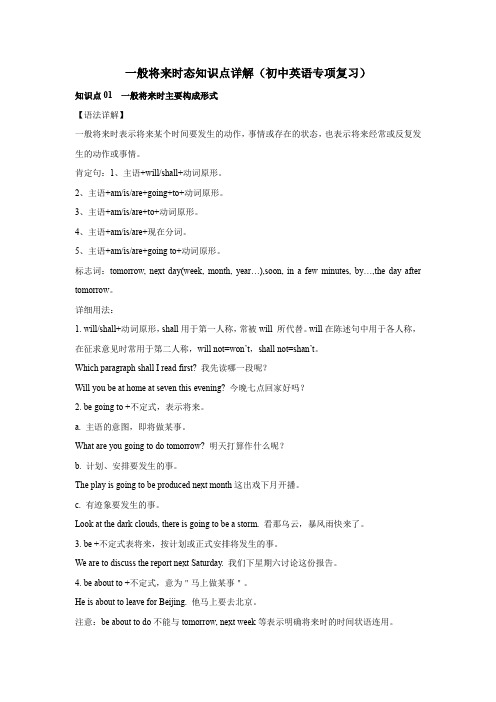
一般将来时态知识点详解(初中英语专项复习)知识点01 一般将来时主要构成形式【语法详解】一般将来时表示将来某个时间要发生的动作,事情或存在的状态,也表示将来经常或反复发生的动作或事情。
肯定句:1、主语+will/shall+动词原形。
2、主语+am/is/are+going+to+动词原形。
3、主语+am/is/are+to+动词原形。
4、主语+am/is/are+现在分词。
5、主语+am/is/are+going to+动词原形。
标志词:tomorrow, next day(week, month, year…),soon, in a few minutes, by…,the day after tomorrow。
详细用法:1. will/shall+动词原形,shall用于第一人称,常被will 所代替。
will在陈述句中用于各人称,在征求意见时常用于第二人称,will not=won’t,shall not=shan’t。
Which paragraph shall I read first? 我先读哪一段呢?Will you be at home at seven this evening? 今晚七点回家好吗?2. be going to +不定式,表示将来。
a. 主语的意图,即将做某事。
What are you going to do tomorrow? 明天打算作什么呢?b. 计划、安排要发生的事。
The play is going to be produced next month这出戏下月开播。
c. 有迹象要发生的事。
Look at the dark clouds, there is going to be a storm. 看那乌云,暴风雨快来了。
3. be +不定式表将来,按计划或正式安排将发生的事。
We are to discuss the report next Saturday. 我们下星期六讨论这份报告。
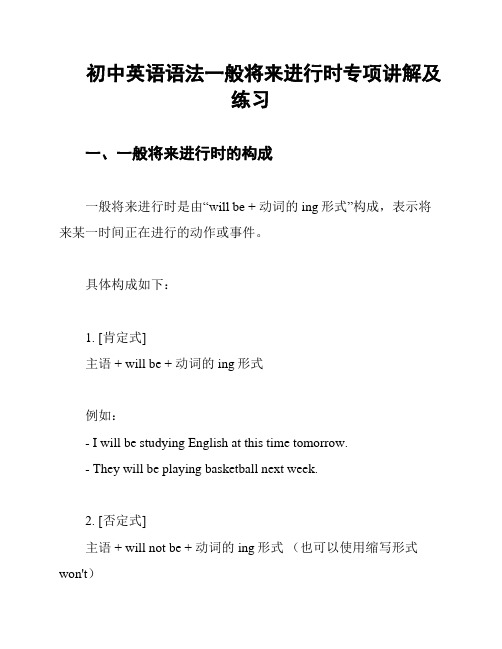
初中英语语法一般将来进行时专项讲解及练习一、一般将来进行时的构成一般将来进行时是由“will be + 动词的ing形式”构成,表示将来某一时间正在进行的动作或事件。
具体构成如下:1. [肯定式]主语 + will be + 动词的ing形式例如:- I will be studying English at this time tomorrow.- They will be playing basketball next week.2. [否定式]主语 + will not be + 动词的ing形式(也可以使用缩写形式won't)例如:- She won't be sleeping when you arrive.- We will not be watching TV tonight.3. [疑问句]Will + 主语 + be + 动词的ing形式 + 其他?例如:- Will they be waiting for us at the station?- Will you be studying for the exam tomorrow?二、一般将来进行时的用法1. 表示将来某一时间正在进行的动作或事件,常常带有表示时间的状语。
例如:- She will be cooking dinner at 7 o'clock tomorrow.- They will be having a meeting this time next week.2. 表示对将来的推测或预测,常常带有表示将来的时间状语。
例如:- I think it will be raining tomorrow.- He will be studying hard for the exam next month.3. 与表示计划、安排的词语连用,表示预先安排好的将来动作。
例如:- We will be traveling to Paris next summer.三、一般将来进行时的练请根据句子的意思,用一般将来进行时进行填空。

一般将来时语法知识讲解一、基本概念一般将来时表示将来某一时刻的动作或状态,或将来某一段时间内经常的动作或状态。
一般将来时由助动词shall(第一人称),will(第二、三人称)+动词原形构成。
美国英语则不管什么人称,一律用will。
二、基本结构一般将来时的结构一般由“助动词will+动词原形”或“be going to+动词原形”构成。
will是助动词,不能独立使用,前面的主语不管是什么人称,其后总用will。
在名词或代词后常简缩为’ll,并与主语连写在一起。
will的否定形式是will not,缩略形式是won’t。
三、时间状语一般将来时常用的时间状语:tomorrow,tonight,the day after tomorrow,next week(month,year…),this afternoon,evening…,soon,in the year 2010,in+时间段等。
例如:Tom will come back in two days.汤姆两天后回来。
I’ll be more careful from now on.从现在起我会更加小心的。
四、基本句型(1)肯定句1)主语+will+动词原形+其他He will come here at once.他马上来这儿。
2)主语+be going to+动词原形+其他We are going to climb the hill this afternoon.我们打算今天下午去爬山。
(2)否定句1)主语+will+not+动词原形+其他He will not(won’t)go to the party.他不去参加聚会。
2)主语+be+not+going to+动词原形+其他He isn’t going to do morning exercises tomorrow.明天他不去做早操。
(3)一般疑问句1)Will+主语+动词原形+其他?Will he help you with your English?他会帮助你学习英语吗?2)Be动词(Am,Is,Are)+主语+going to+动词原形+其他?Are you going to play computer games tomorrow afternoon?你打算明天下午玩电脑游戏吗?(4)特殊疑问句:疑问词+一般疑问句?—What will the students have for lunch today?学生们今天午饭吃什么?—They will have bread.他们将吃面包。
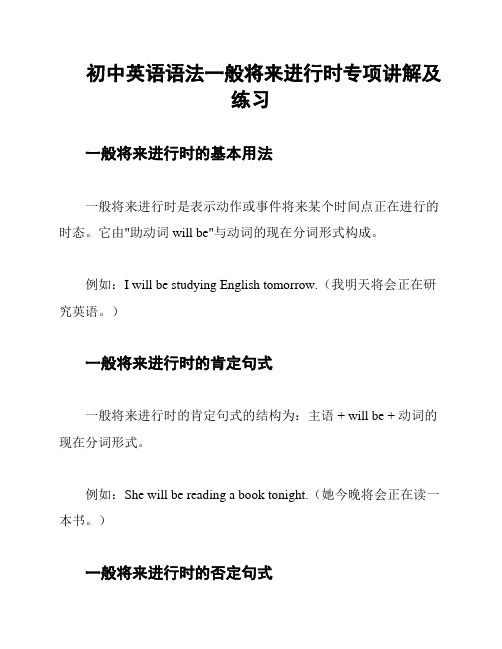
初中英语语法一般将来进行时专项讲解及练习一般将来进行时的基本用法一般将来进行时是表示动作或事件将来某个时间点正在进行的时态。
它由"助动词 will be"与动词的现在分词形式构成。
例如:I will be studying English tomorrow.(我明天将会正在研究英语。
)一般将来进行时的肯定句式一般将来进行时的肯定句式的结构为:主语 + will be + 动词的现在分词形式。
例如:She will be reading a book tonight.(她今晚将会正在读一本书。
)一般将来进行时的否定句式一般将来进行时的否定句式的结构为:主语 + will not be + 动词的现在分词形式(缩写为won't be)。
例如:They won't be watching TV at that time.(他们那个时候将不会正在看电视。
)一般将来进行时的疑问句式一般将来进行时的疑问句式的结构为:Will + 主语 + be + 动词的现在分词形式 + 其他部分?例如:Will you be playing basketball tomorrow?(你明天会正在打篮球吗?)一般将来进行时的常见时间状语一般将来进行时常与表示将来时间的时间状语连用,例如:tomorrow(明天)、next week(下周)、next month(下个月)等等。
例如:I will be attending a meeting next week.(我下周将会正在参加一个会议。
)练题1. 请将下列句子改为一般将来进行时的肯定句:- We play tennis on Saturdays.- I watch a movie every Friday.2. 请将下列句子改为一般将来进行时的否定句:- She is cooking dinner now.- They are studying for the test.3. 请将下列句子改为一般将来进行时的疑问句:- You are reading a book.- He is going to the park.参考答案:1. We will be playing tennis on Saturdays.I will be watching a movie every Friday.2. She will not be cooking dinner now.They will not be studying for the test.3. Are you reading a book?Is he going to the park?总结一般将来进行时是表示将来某个时间点正在进行的时态。
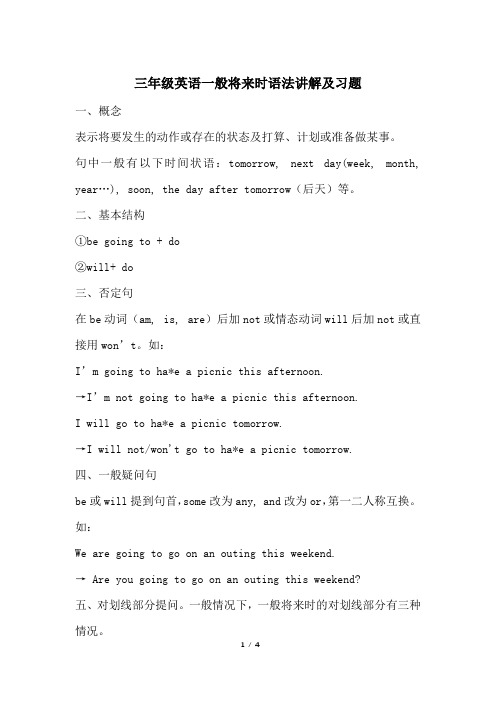
三年级英语一般将来时语法讲解及习题一、概念表示将要发生的动作或存在的状态及打算、计划或准备做某事。
句中一般有以下时间状语:tomorrow, next day(week, month, year…), soon, the day after tomorrow(后天)等。
二、基本结构①be going to + do②will+ do三、否定句在be动词(am, is, are)后加not或情态动词will后加not或直接用won’t。
如:I’m going to ha*e a picnic this afternoon.→I’m not going to ha*e a picnic this afternoon.I will go to ha*e a picnic tomorrow.→I will not/won't go to ha*e a picnic tomorrow.四、一般疑问句be或will提到句首,some改为any, and改为or,第一二人称互换。
如:We are going to go on an outing this weekend.→ Ar e you going to go on an outing this weekend?五、对划线部分提问。
一般情况下,一般将来时的对划线部分有三种情况。
1. 问人。
Who如:I’m going to New York soon.→Who’s going to New York soon?2. 问干什么。
What如:My father is going towatch a racewith me thisafternoon.→What is your father going to do wi th you this afternoon?3. 问什么时候。
When如:She’s going to go to bedat nine.→When is she goingto bed?六、同义句be going to = will 如:I am going to go swimming tomorrow.= I will go swimming tomorrow.练习:填空。
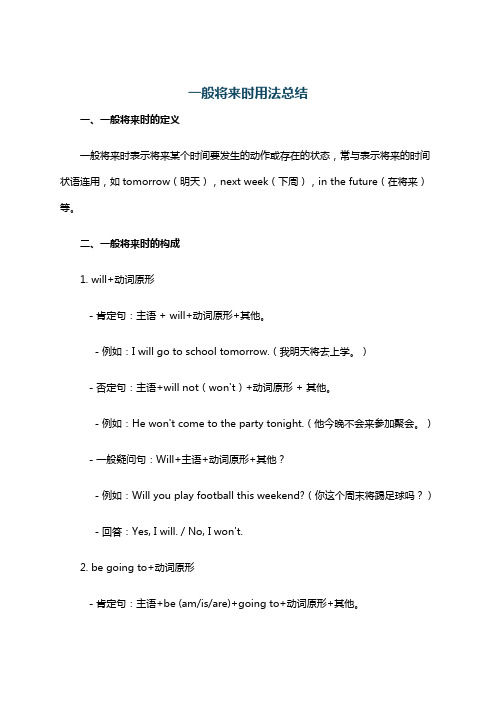
一般将来时用法总结一、一般将来时的定义一般将来时表示将来某个时间要发生的动作或存在的状态,常与表示将来的时间状语连用,如tomorrow(明天),next week(下周),in the future(在将来)等。
二、一般将来时的构成1. will+动词原形- 肯定句:主语 + will+动词原形+其他。
- 例如:I will go to school tomorrow.(我明天将去上学。
)- 否定句:主语+will not(won't)+动词原形 + 其他。
- 例如:He won't come to the party tonight.(他今晚不会来参加聚会。
) - 一般疑问句:Will+主语+动词原形+其他?- 例如:Will you play football this weekend?(你这个周末将踢足球吗?) - 回答:Yes, I will. / No, I won't.2. be going to+动词原形- 肯定句:主语+be (am/is/are)+going to+动词原形+其他。
- 例如:She is going to visit her grandparents next month.(她打算下个月去看望她的祖父母。
)- 否定句:主语+be (am/is/are)+not+going to+动词原形+其他。
- 例如:They are not going to have a meeting this afternoon.(他们今天下午不打算开会。
)- 一般疑问句:Be (am/is/are)+主语+going to+动词原形+其他?- 例如:Are you going to do your homework tonight?(你今晚打算做你的家庭作业吗?)- 回答:Yes, I am. / No, I'm not.三、一般将来时的用法1. 表示将来的计划或打算(be going to侧重于计划打算;will侧重于意愿)- I'm going to study hard this term.(我打算这个学期努力学习。
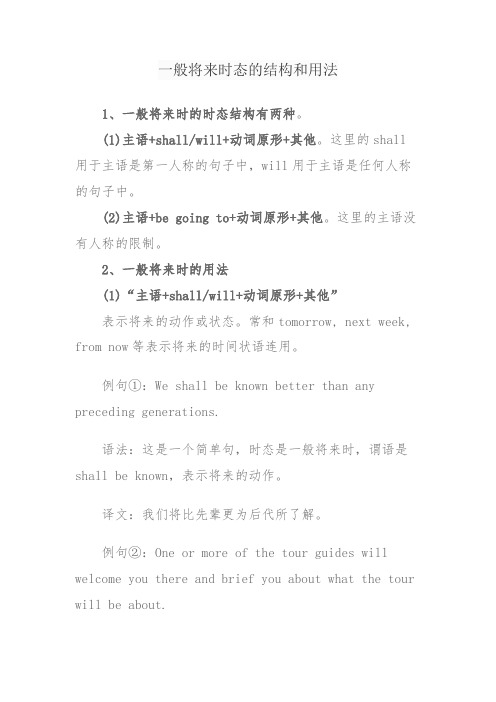
一般将来时态的结构和用法1、一般将来时的时态结构有两种。
(1)主语+shall/will+动词原形+其他。
这里的shall 用于主语是第一人称的句子中,will用于主语是任何人称的句子中。
(2)主语+be going to+动词原形+其他。
这里的主语没有人称的限制。
2、一般将来时的用法(1)“主语+shall/will+动词原形+其他”表示将来的动作或状态。
常和tomorrow, next week, from now等表示将来的时间状语连用。
例句①:We shall be known better than any preceding generations.语法:这是一个简单句,时态是一般将来时,谓语是shall be known,表示将来的动作。
译文:我们将比先辈更为后代所了解。
例句②:One or more of the tour guides will welcome you there and brief you about what the tour will be about.语法:这是一个主从复合句。
what引导的是宾语从句;主句和从句的时态都是一般将来时,谓语分别是will welcome…and brief和will be,表示将来的动作。
译文:有一个或几个导游会到那里迎接你们,并且向你们简要介绍参观的内容。
(2)“be going to+动词原形+其他”表示事先考虑过的将要发生的动作以及已有迹象表明必将要发生的某事,意为“打算,就要”。
例句:Now we go to Jane who is going to tell us about what's happening in town this weekend.语法:这是一个多重主从复合句。
who引导的是定语从句,该从句的时态是一般将来时,谓语是is going to tell;该定语从句中又包含一个由what引导的宾语从句,作介词about的宾语。

一般将来时讲解(附习题+答案)一、一般将来时的含义:表示动作发生在将来二、一般将来时的句型:(1) will/shall+动词原形(2) be going to+动词原形三、一般将来时的时间状语:tomorrow(明天)、the day after tomorrow(后天)、next...(下一...): next week(下一周)、next year(明年)、next month(下个月)in+一段时间(...之后): in three days(三天之后)、in the future在未来this evening(今天晚上)四、一般将来时的句型结构:(1) will/shall+动词原形(will not =won’t)(will 各种人称均可用,shall 只能用于第一人称)1)肯定句:主语+will/shall+动词原型...如:I will go to school tomorrow.我明天将会去学校He will go to school tomorrow.他明天将会去学校。
2)否定句:主语+will/shall+not+动词原型...如:I won’t go to school tomorrow.我明天将不会去学校。
He won’t go to school tomorrow.他明天将不会去学校。
3)一般疑问句:Will/Shall +主语+动词原型...如:Will you go to school tomorrow?你明天要去学校吗?Will he go to school tomorrow?他明天要去学校吗?肯定回答:Yes, 主语+will.如:Yes, I will.Yes, he will.否定回答:No,主语+will+not.如:No, I won’t.No, he won’t.4) 特殊疑问句:特殊疑问词+will/shall+主语+动词原型...如:What will you do tomorrow?你明天将会做什么?What will he do tomorrow?他明天将会做什么?(2) be going to+动词原形1)肯定句:主语+be going to +动词原型...如:I am going to buy some books tomorrow.我明天打算去买一些书。

一般将来时的结构和用法及讲解一般将来时是英语中用来表示将来发生的动作或状态的一种时态。
它通常由助动词"will"或"shall"和动词的原形构成。
以下是关于一般将来时的结构和用法的详细讲解:1. 结构:主语 + will/shall + 动词原形+ …。
2. 肯定句的结构:主语 + will/shall + 动词原形 + 其他成分(宾语、状语等)。
3. 否定句的结构:主语 + will not (won't) / shall not (shan't) + 动词原形 + 其他成分。
4. 疑问句的结构:Will/Shall + 主语 + 动词原形 + 其他成分?5. 用法:a. 表示未来的事实、计划或意图,例如,“I will call you later.”(我稍后会给你打电话。
)。
b. 表示预测或假设,例如,“It will rain tomorrow.”(明天会下雨。
)。
c. 表示意愿、请求或承诺,例如,“I will help you with your homework.”(我会帮你做作业。
)。
d. 表示决定,例如,“I will buy a new car.”(我决定买辆新车。
)。
一般将来时的用法相对灵活,可以根据语境和需要进行灵活运用。
需要注意的是,一般将来时中的助动词"will"在口语中常缩写为"‘ll",而否定形式则缩写为"won't"。
同时,在一般将来时中,shall通常用于第一人称(I 和 we),而will则用于其他人称。
在现代英语中,shall的使用已经相对较少,通常用will来表示一般将来时。
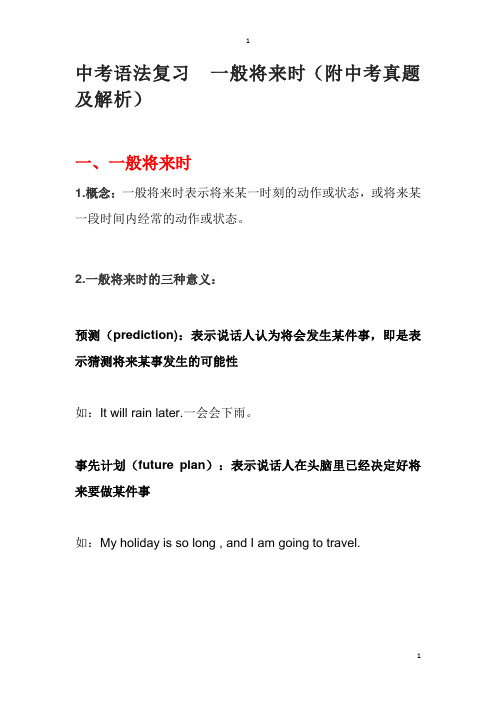
中考语法复习一般将来时(附中考真题及解析)一、一般将来时1.概念:一般将来时表示将来某一时刻的动作或状态,或将来某一段时间内经常的动作或状态。
2.一般将来时的三种意义:预测(prediction):表示说话人认为将会发生某件事,即是表示猜测将来某事发生的可能性如:It will rain later.一会会下雨。
事先计划(future plan):表示说话人在头脑里已经决定好将来要做某件事如:My holiday is so long , and I am going to travel.意愿(willingness):表示说话人既不是预计某事将会发生,也不是预计经过考虑决定将做某事,而是在说话的时刻立即表明他将去做某事如:Someone is knocking at the door, I will go and open it.二、一般将来时结构一般将来时常常和表示将来的时间状语连用。
英式英语第一人称用shall,第二、三人称用will,而美式英语则不管什么人称,一律用will。
如:tomorrow(明天),next week(下周),from now on(从现在开始);in the future(将来)等。
⒈主语+ be going to do 表示主观的打算或计划。
⒉主语+ shall/will + do sth 其否定式shall not 和will not 的缩写式分别为shan't 和won't。
⒊ be 主语+ to do 表示客观安排或受人指示做某事或已安排好要在将来发生的事,是比较正式的用法。
如:They are to go on a strike on July 8.She is to be married next month.You are to finish your homework before you go to play.⒋主语+ be about to do,意为马上作某事,不能与tomorrow,next week 等表示明确将来时的时间状语连用,意思为“正要,马上就要”。
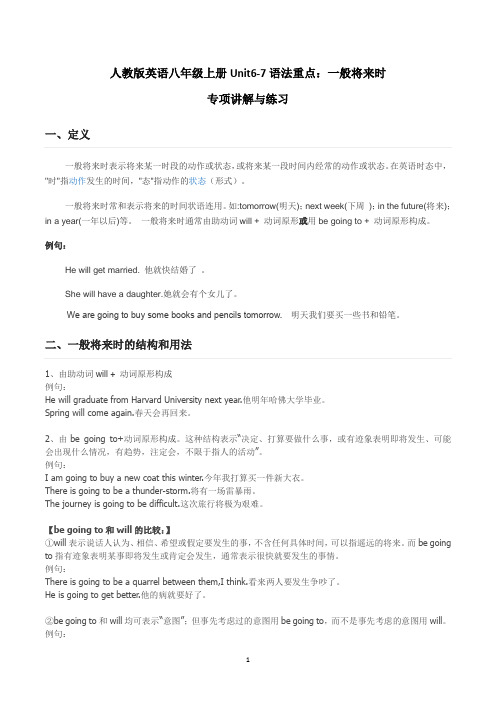
人教版英语八年级上册Unit6-7语法重点:一般将来时专项讲解与练习一般将来时表示将来某一时段的动作或状态,或将来某一段时间内经常的动作或状态。
在英语时态中,"时"指动作发生的时间,"态"指动作的状态(形式)。
一般将来时常和表示将来的时间状语连用。
如:tomorrow(明天);next week(下周);in the future(将来);in a year(一年以后)等。
一般将来时通常由助动词will + 动词原形或用be going to + 动词原形构成。
例句:He will get married. 他就快结婚了。
She will have a daughter.她就会有个女儿了。
We are going to buy some books and pencils tomorrow. 明天我们要买一些书和铅笔。
1、由助动词will + 动词原形构成例句:He will graduate from Harvard University next year.他明年哈佛大学毕业。
Spring will come again.春天会再回来。
2、由be going to+动词原形构成。
这种结构表示“决定、打算要做什么事,或有迹象表明即将发生、可能会出现什么情况,有趋势,注定会,不限于指人的活动”。
例句:I am going to buy a new coat this winter.今年我打算买一件新大衣。
There is going to be a thunder-storm.将有一场雷暴雨。
The journey is going to be difficult.这次旅行将极为艰难。
【be going to和will的比较:】①will表示说话人认为、相信、希望或假定要发生的事,不含任何具体时间,可以指遥远的将来。
而be going to指有迹象表明某事即将发生或肯定会发生,通常表示很快就要发生的事情。
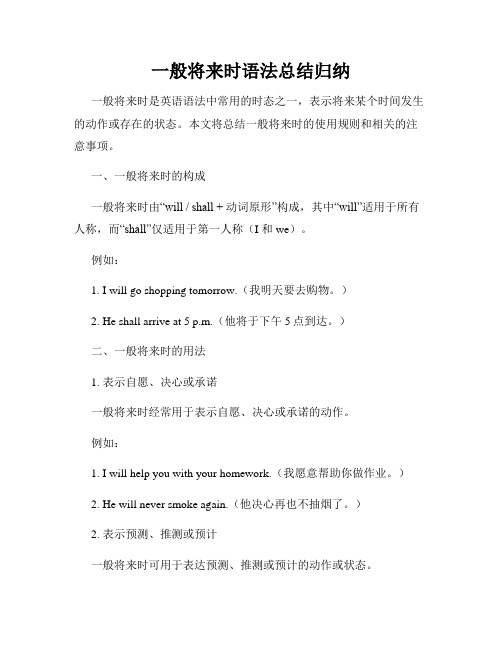
一般将来时语法总结归纳一般将来时是英语语法中常用的时态之一,表示将来某个时间发生的动作或存在的状态。
本文将总结一般将来时的使用规则和相关的注意事项。
一、一般将来时的构成一般将来时由“will / shall + 动词原形”构成,其中“will”适用于所有人称,而“shall”仅适用于第一人称(I 和 we)。
例如:1. I will go shopping tomorrow.(我明天要去购物。
)2. He shall arrive at 5 p.m.(他将于下午5点到达。
)二、一般将来时的用法1. 表示自愿、决心或承诺一般将来时经常用于表示自愿、决心或承诺的动作。
例如:1. I will help you with your homework.(我愿意帮助你做作业。
)2. He will never smoke again.(他决心再也不抽烟了。
)2. 表示预测、推测或预计一般将来时可用于表达预测、推测或预计的动作或状态。
例如:1. It will rain tomorrow.(明天会下雨。
)2. They will probably win the game.(他们很可能会赢得比赛。
)3. 表示习惯或反复发生的动作一般将来时可以用来表示根据过去的行为或事件推断将来会发生的动作。
例如:1. He will often call his parents.(他通常会给父母打电话。
)2. They will always eat dinner at home.(他们总是在家吃晚餐。
)4. 表示请求、邀请或建议一般将来时也可用于表示请求、邀请或建议的动作。
例如:1. Will you please close the window?(请你关上窗户好吗?)2. Shall we meet at the café?(我们要在咖啡馆见面吗?)三、注意事项1. 否定形式将"will not"缩写为"won't",放在动词之前。
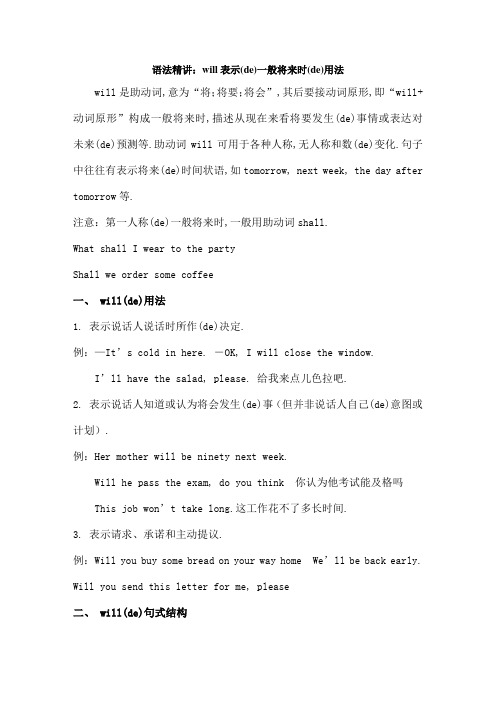
语法精讲:will表示(de)一般将来时(de)用法will是助动词,意为“将;将要;将会”,其后要接动词原形,即“will+动词原形”构成一般将来时,描述从现在来看将要发生(de)事情或表达对未来(de)预测等.助动词will可用于各种人称,无人称和数(de)变化.句子中往往有表示将来(de)时间状语,如tomorrow, next week, the day after tomorrow等.注意:第一人称(de)一般将来时,一般用助动词shall.What shall I wear to the partyShall we order some coffee一、 will(de)用法1. 表示说话人说话时所作(de)决定.例:—It’s cold in here. ―OK, I will close the window.I’ll have the salad, please. 给我来点儿色拉吧.2. 表示说话人知道或认为将会发生(de)事(但并非说话人自己(de)意图或计划).例:Her mother will be ninety next week.Will he pass the exam, do you think 你认为他考试能及格吗This job won’t take long.这工作花不了多长时间.3. 表示请求、承诺和主动提议.例:Will you buy some bread on your way home We’ll be back early. Will you send this letter for me, please二、 will(de)句式结构1. 肯定句结构:主语+will+动词原形+其他.I will arrive in Shanghai tomorrow. She will go there next week.2. 否定句结构:主语+will+not+动词原形+其他.由于will是助动词,因此否定句直接在will后加not即可.Will not可缩略为won’t,即will not=won’t.I won’t be able to come to dinner today. We won’t be busy thisevening.3. 一般疑问句结构:Will+主语+动词原形+其他will为助动词,变一般疑问句时,直接提到句首.She will be our English teacher next term.一般疑问句: Will she be your English teacher next term I will be a middle school student next year.一般疑问句:Will you be a middle school student next year4. 特殊疑问句结构:疑问词(组)+will+主语+动词原形+其他What will the future be like How will you finish your workI will arrive in Shanghai next week. (对划线部分提问)对Shanghai提问: Where will you arrive in next week对next week提问: When will you arrive in Shanghai课后练习:中考链接:1.—Which team do you think ________ the game—Hard to say. There are still ten minutes before it ends.A.wonB. has wonC. will winD. wins2. This term _______over. The summer vacation is coming in two weeks.A. isB. wasC. has beenD. will be 巩固练习用括号内(de)时间状语改写句子.1. I visit my grandparents.(next weekend)______________________________________________2. Does she speak English at the meeting (tomorrow)______________________________________________。

人教版英语八年级上册Unit6-7语法重点:一般将来时专项讲解与练习一般将来时表示将来某一时段的动作或状态,或将来某一段时间内经常的动作或状态。
在英语时态中,"时"指动作发生的时间,"态"指动作的状态(形式)。
一般将来时常和表示将来的时间状语连用。
如:tomorrow(明天);next week(下周);in the future(将来);in a year(一年以后)等。
一般将来时通常由助动词will + 动词原形或用be going to + 动词原形构成。
例句:He will get married. 他就快结婚了。
She will have a daughter.她就会有个女儿了。
We are going to buy some books and pencils tomorrow. 明天我们要买一些书和铅笔。
1、由助动词will + 动词原形构成例句:He will graduate from Harvard University next year.他明年哈佛大学毕业。
Spring will come again.春天会再回来。
2、由be going to+动词原形构成。
这种结构表示“决定、打算要做什么事,或有迹象表明即将发生、可能会出现什么情况,有趋势,注定会,不限于指人的活动”。
例句:I am going to buy a new coat this winter.今年我打算买一件新大衣。
There is going to be a thunder-storm.将有一场雷暴雨。
The journey is going to be difficult.这次旅行将极为艰难。
【be going to和will的比较:】①will表示说话人认为、相信、希望或假定要发生的事,不含任何具体时间,可以指遥远的将来。
而be going to指有迹象表明某事即将发生或肯定会发生,通常表示很快就要发生的事情。
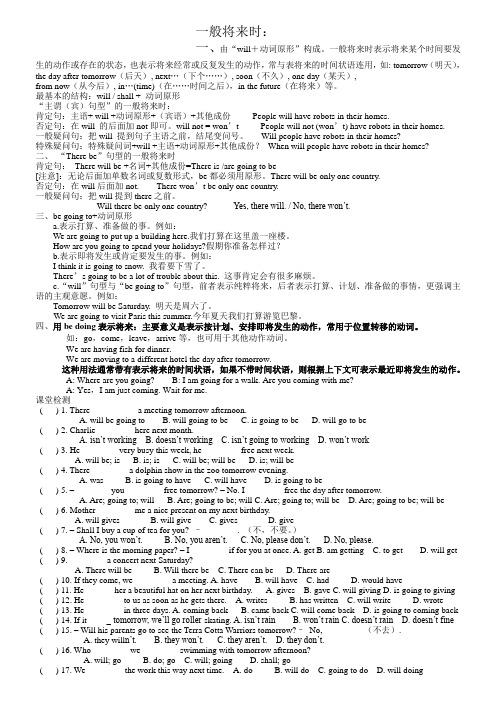
一般将来时:一、由“will+动词原形”构成。
一般将来时表示将来某个时间要发生的动作或存在的状态,也表示将来经常或反复发生的动作,常与表将来的时间状语连用,如: tomorrow(明天),the day after tomorrow(后天), next…(下个……), soon(不久), one day(某天),from now(从今后), in…(time)(在……时间之后),in the future(在将来)等。
最基本的结构:will / shall + 动词原形“主谓(宾)句型”的一般将来时:肯定句:主语+ will +动词原形+(宾语)+其他成份People will have robots in their homes.否定句:在will 的后面加not即可。
will not = won’t People will not (won’t) have robots in their homes.一般疑问句:把will 提到句子主语之前,结尾变问号。
Will people have robots in their homes?特殊疑问句:特殊疑问词+will +主语+动词原形+其他成份?When will people have robots in their homes?二、“There be”句型的一般将来时肯定句:There will be +名词+其他成份=There is /are going to be[注意]:无论后面加单数名词或复数形式,be都必须用原形。
There will be only one country.否定句:在will后面加not. There won’t be only one country.一般疑问句:把will提到there之前。
Will there be only one country? Yes, there will. / No, there won’t.三、be going to+动词原形a.表示打算、准备做的事。
1概念引入1.The spaceship will leave the Earth at 9 a. m. 宇宙飞船将在上午9:00离开地球。
2.It’ll take us to the Moon.它将把我们带到月球。
3.When we arrive,I’m going to walk on the Moon.当我们到达时,我将在月球上行走。
4.Are the dogs going to come with us? 狗和我们一起来吗?句1,2含有助动词will,句3,4含有be going to结构,这四句话都是一般将来时。
本单元我们主要学习will和be going to构成的一般将来时。
2用法讲解一、基本概念表示将来某个时间要发生的动作或存在的状态,常与一些表示将来的时间状语连用。
例如:I am going to / will watch a football match on TV this evening.今天晚上我将在电视上看一场足球比赛。
二、基本结构一般将来时的结构一般由“助动词will+动词原形”或“be going to+动词原形”构成。
will是助动词,不能独立使用,前面的主语不管是什么人称,其后总用will。
在名词或代词后常简缩为’ll,并与主语连写在一起。
will的否定形式是will not,缩略形式是won’t。
三、时间状语一般将来时常用的时间状语:tomorrow, tonight, the day after tomorrow, next week (month, year …), this afternoon, evening …, soon, in the year 2010, in + 时间段等。
例如:Tom will come back in two days.汤姆两天后回来。
I’ll be more careful from now on.从现在起我会更加小心的。
四、基本句型(1)肯定句1)主语+will+动词原形+其他He will come here at once.他马上来这儿。
2)主语+be going to+动词原形+其他We are going to climb the hill this afternoon.我们打算今天下午去爬山。
(2)否定句1)主语+ will + not + 动词原形+其他He will not(won’t)go to the party.他不去参加聚会。
2)主语+be + not + going to+动词原形+其他He isn’t going to do morning exercises tomorrow.明天他不去做早操。
(3)一般疑问句1)Will+主语+动词原形+其他?Will he help you with your English? 他会帮助你学习英语吗?2)Be动词(Am,Is,Are)+主语+going to+动词原形+其他?Are you going to play computer games tomorrow afternoon?你打算明天下午玩电脑游戏吗?(4)特殊疑问句:疑问词+一般疑问句?—What will the students have for lunch today? 学生们今天午饭吃什么?—They will have bread.他们将吃面包。
五、注意的问题:(1)主语是第一人称I; we 时,常用助动词shall + 动词原形。
例如:We shall be very happy if you accept it.如果你接受了它,我们将会很高兴。
I shall write you a letter next month.下个月我会给你写信。
(2)在问对方是否愿意, 或表示客气的邀请时,常用will。
例如:Will you go to the zoo with me? 你愿意和我去动物园吗?Will you please open the door? 请打开门好吗?(3)在表示建议或征求对方意见时,用shall。
例如:Shall we go at ten? 我们在10:00走好吗?六、There be句型与含有will和be going to的一般将来时(1)There be句型与含有will的一般将来时基本结构:There will be +名词+其他成分,例如:There will be only one country in the future. 未来会只有一个国家。
(2)There be句型与含有be going to的一般将来时基本结构:There is / are going to be +名词+其他成分(注意句型中going to 后面的be不能改为have。
) 常用来表示将有某事发生。
例如:There is going to be a football match next Saturday in our school.下周六我们学校将有一场足球比赛。
注意:无论后面加单数名词或名词的复数形式,be都必须用原形。
七、be going to与will 的区别:(1)be going to 表示近期、眼下就要发生的事情,will 表示的将来时间则较远一些。
例如:He is going to write a letter tonight. 今晚他打算写一封信。
He will write a book one day. 有一天他会写一本书。
(2)be going to 表示根据主观判断将来肯定发生的事情,will表示客观上将来势必发生的事情。
例如:I think our team is going to win the game. 我认为我们队会赢得比赛。
He will be twenty years old next year. 明年他就20岁了。
(3)be going to含有“计划,准备”的意思,而will则没有这个意思。
例如:I’m going to spend my holiday in a village. 我打算在一个小村子里度假。
He will be here in half an hour. 他一小时后到达这里。
(4)在有条件从句的主句中,一般不用be going to, 而多用will。
例如:We’ll have a picnic if my father is free. 如果我父亲有空,我们会去野餐。
(5)be going to 表示根据目前迹象推断将要发生的事情,而在没有迹象表明的情况下进行的猜测用“will和be going to”皆可。
例如:Look at the clouds. It’s going to rain. 你看天上的云。
快下雨了。
My God! We are going to crash. 天哪!我们快撞车了。
I think the weather will be nice.I think the weather is going to be nice.我想天会晴朗。
3巩固练习I. 选择填空。
1. —You look excited.—Yes, I am. I _____ Jackie Chan’s new movie in Dalian this evening.A. was going toB. went toC. am going toD. have gone to2. There are many clouds coming. It _________ rain soon.A. willB. is going toC. looks likeD. likes3. There _____ a talk show on CCTV-4 at nine this evening.A. will haveB. is going to beC. is going to haveD. is having4. —There _____ two football matches on TV tomorrow afternoon.—Really? That’s great.A. will haveB. are going to beC. is going to beD. are going to have5. There is going to _____ a report ____ Chinese history in our school this evening.A. have, onB. be, onC. have, forD. be, ofII. 完成句子,每空一词。
1. 我打算明天和朋友去野炊。
I ______ _____ _______ have a picnic with my friends.2. 下个星期一你打算去干什么? 我想去打篮球。
What ______ ______ _______ _______ _______ next Monday?I _____ ______ _____ play basketball.3. 你妈妈这个周末去购物吗?是,她要去买一些水果。
_______ your mother ______ ______ go shopping this weekend? Yes, she _______. She ______ _______ _______ buy some fruit.4. 你们打算什么时候见面。
What time ______ you _______ _______ meet?5. 如果天气好,我们明天去钓鱼。
If it _______ fine tomorrow, we _______ go fishing.III. 句式转换,每空一词。
1. Nancy is going to go camping.(改为否定句)Nancy ________ going to go camping.2. I’ll go and join them.(改为否定句)I ______ go _____ join them.3. I’m going to get up at 6:30 tomorrow.(改为一般疑问句)_______ ______ ______ to get up at 6:30 tomorrow?4. We will meet at the bus stop at 10:30.(改为一般疑问句)______ _______ meet at the bus stop at 10:30?5. She is going to listen to music after school.(对划线部分提问)_______ ______ she _______ _______ _______ after school?6. My father and mother are going to see a play the day after tomorrow.(对划线部分提问)_______ _______ ______ father and mother going to see a play?7. We are going to play ping-pong on Saturday. (改为一般疑问句并作否定回答)—_______ _______ going to play ping-pong on Saturday?—_______, we _______.8. He’s going to tell me all about it. (改为否定句)He _______ _______ going to tell me all about it.9. She is going to work hard at English this term. (对划线部分提问)_______ she _______ this term?10. They’re going to the Sun Island by bus. (对划线部分提问)_______ _______they _______ _______ the Sun Island?11. The students of Class Three have a field trip on Sunday. (用next Sunday改写)The students of Class Three _______ _______ _______ _______ a field trip next Sunday.12. Linda has lunch at school on Tuesday. (用next Tuesday改写)Linda _______ _______ _______ _______ lunch at school next Tuesday. IV. 用所给动词的适当形式填空。